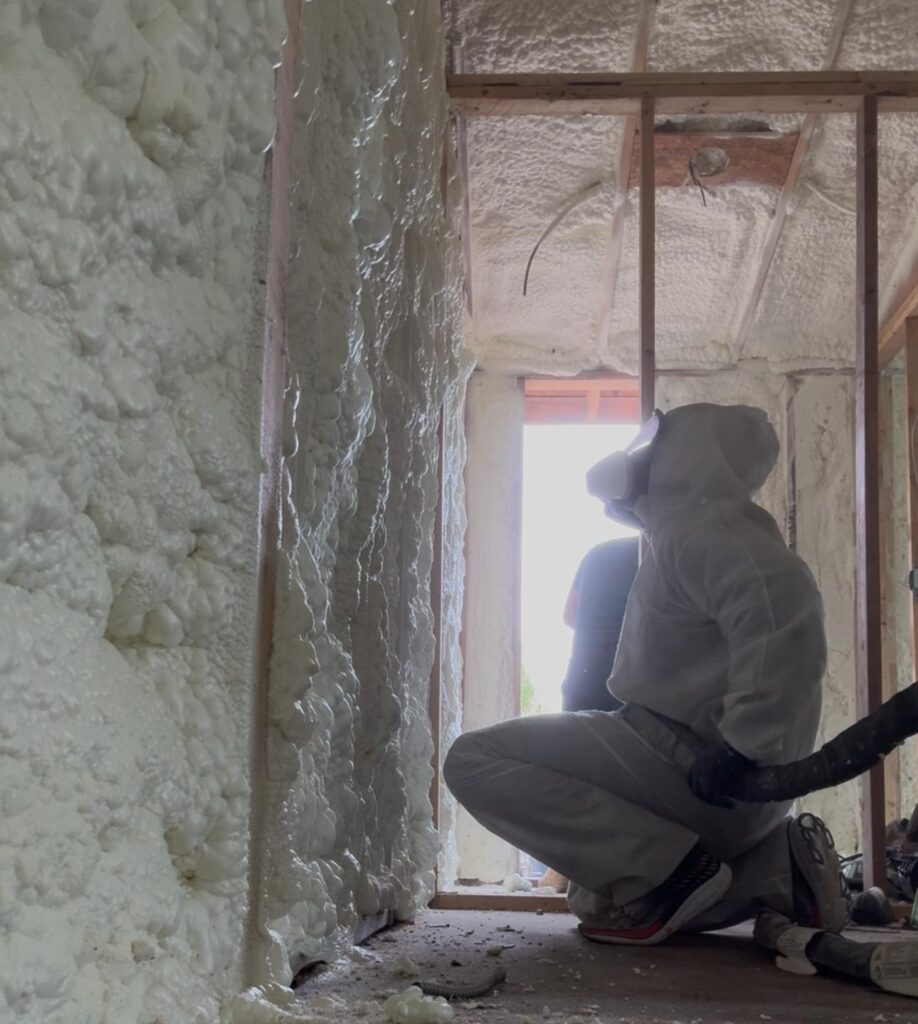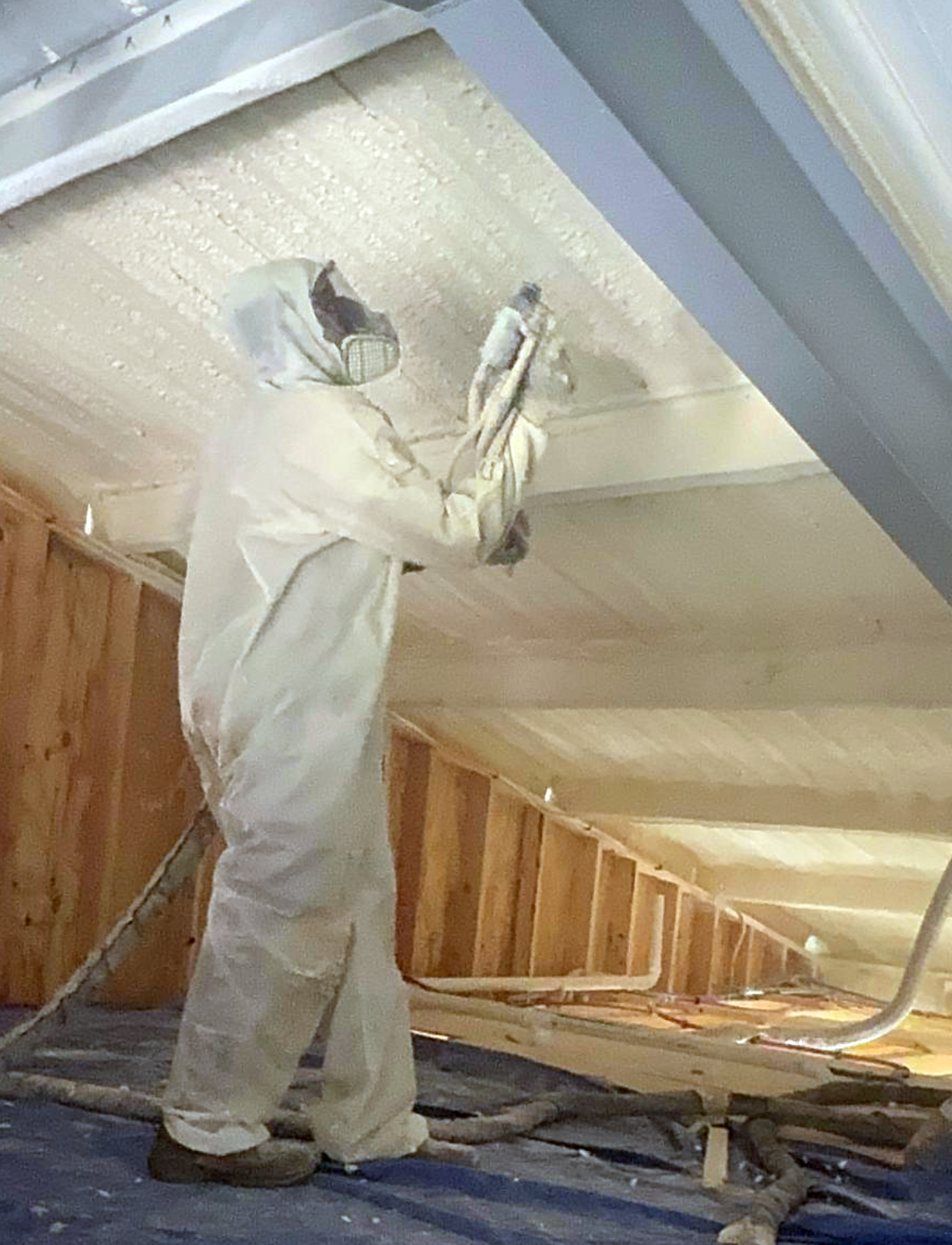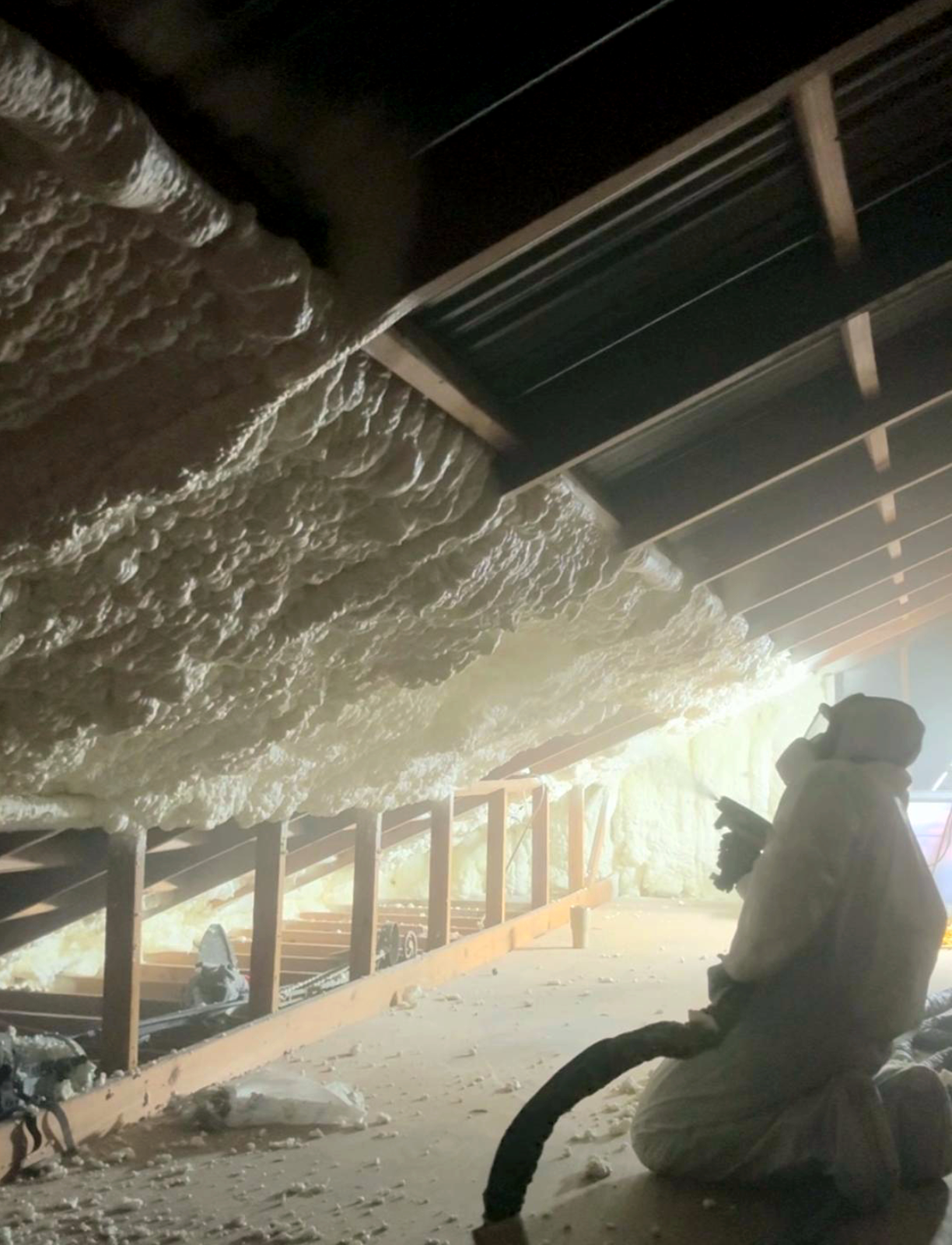Spray Foam Insulation
Why Install Spray Foam Insulation?
Installing spray foam insulation is a reliable and cost-effective solution to improve the energy efficiency of your home. This material covers even the smallest cracks, keeping your space warm in the winter and cool in the summer, while reducing your monthly energy bills. Find out why thousands of homeowners trust the experts at MK insulation for their insulation projects – request a quote today!

What is Spray Foam Insulation?
Spray foam is composed primarily of polyurethane, a high-performance material designed to create an airtight seal that prevents air leakage and minimizes heat transfer. In addition to insulating thermally, it also acts as a moisture barrier and reduces noise transmission.
Types of Spray Foam Insulation?
There are two main types: open-cell foam and closed-cell foam, each with its own advantages. Our local installers will help you choose the ideal option based on your home’s specific needs.
Closed-Cell Foam
This is denser and offers higher R-values, making it the perfect choice for exterior walls and ceilings, especially in areas where moisture and air leakage are frequent concerns.
Open Cell Foam
Lighter and more flexible, this option is ideal for soundproofing and installing in interior walls, offering comfort without compromising space.


Why Choose Spray Foam Insulation?
- Unmatched Air Sealing
- Design Considerations
- Fixture Placement
- Pipe Sizing and Material Selection
- Water Supply Lines
- Drainage System
- Ventilation
- Water Heater Installation
- Inspection and Approval
- Documentation
- Testing
Types of Spray Foam Insulation?
There are two main types: open-cell foam and closed-cell foam, each with its own advantages. Our local installers will help you choose the ideal option based on your home’s specific needs.
Closed-Cell Foam
This is denser and offers higher R-values, making it the perfect choice for exterior walls and ceilings, especially in areas where moisture and air leakage are frequent concerns.

Open Cell Foam
Lighter and more flexible, this option is ideal for soundproofing and installing in interior walls, offering comfort without compromising space.

Why Choose Spray Foam Insulation?
- Unmatched Air Sealing
- Design Considerations
- Fixture Placement
- Pipe Sizing and Material Selection
- Water Supply Lines
- Drainage System
- Ventilation
- Water Heater Installation
- Inspection and Approval
- Documentation
- Testing
Benefits of Spray Foam Insulation
Unmatched Air Sealing
Spray foam expands to fill even the smallest gaps. This superior seal eliminates unnecessary drafts, leaks and energy loss.
Moisture and Mold Resistance
Closed-cell foam acts as a moisture barrier, protecting your home from water damage and reducing the risk of mold and mildew growth. This is especially beneficial in humid climates or in areas prone to leaks and flooding.
Energy Efficiency
With a high R-value, spray foam insulation offers exceptional thermal resistance, keeping your home warm in winter and cool in summer, all while saving energy.
Structural Strengthening
Closed-cell foam also improves the rigidity of walls and ceilings, increasing structural integrity. This can be especially valuable in areas with adverse weather conditions.
Improves Indoor Air Quality
By blocking particles such as dust, pollen and other external pollutants, this type of insulation contributes to a healthier indoor environment, especially benefiting people with allergies or respiratory problems.
Installing spray foam insulation is a reliable and cost-effective solution to improve the energy efficiency of your home. This material covers even the smallest cracks, keeping your space warm in the winter and cool in the summer, while reducing your monthly energy bills. Find out why thousands of homeowners trust the experts at MK Insulation for their insulation projects – request a quote today!
What is Spray Foam Insulation?
Spray foam is composed primarily of polyurethane, a high-performance material designed to create an airtight seal that prevents air leakage and minimizes heat transfer. In addition to insulating thermally, it also acts as a moisture barrier and reduces noise transmission. There are two main types: open-cell foam and closed-cell foam, each with its own advantages. Our local installers will help you choose the ideal option based on your home’s specific needs.
Closed-Cell Foam**: This is denser and offers higher R-values, making it the perfect choice for exterior walls and ceilings, especially in areas where moisture and air leakage are frequent concerns.
- Open Cell Foam**: Lighter and more flexible, this option is ideal for soundproofing and installing in interior walls, offering comfort without compromising space. Spray Insulation for Whole Home Protection
Spray-on insulation is ideal for attics, walls, basements and floors. It is particularly effective in areas prone to drafts or where traditional materials fail to completely fill gaps or stop air leakage.
Why Choose Spray Foam Insulation?
- Unmatched Air Sealing
Spray foam expands to fill even the smallest gaps. This superior seal eliminates unnecessary drafts, leaks and energy loss. - Moisture and Mold Resistance
Closed-cell foam acts as a moisture barrier, protecting your home from water damage and reducing the risk of mold and mildew growth. This is especially beneficial in humid climates or in areas prone to leaks and flooding. - Energy Efficiency
With a high R-value, spray foam insulation offers exceptional thermal resistance, keeping your home warm in winter and cool in summer, all while saving energy. - Structural Strengthening
Closed-cell foam also improves the rigidity of walls and ceilings, increasing structural integrity. This can be especially valuable in areas with adverse weather conditions. - Improves Indoor Air Quality
By blocking particles such as dust, pollen and other external pollutants, this type of insulation contributes to a healthier indoor environment, especially benefiting people with allergies or respiratory problems.
Frequently Asked Questions about Spray Foam Insulation
How Much does Spray Foam Insulation Cost?
The cost varies depending on the type of foam, the R-value required, the size and complexity of the area to be insulated, as well as the thickness of the application. You may qualify for tax credits and discounts that reduce the total cost. We always provide a detailed quotation before starting any work.
Is Spray Foam Insulation Safe Once Cured?
Yes, once cured, polyurethane spray foam is considered safe. During installation, when mixing the components (isocyanates and polyols), it is important to take precautions. Our technicians use appropriate protective equipment and ventilate the area to ensure your safety during the process.
Is Sprayed Foam Insulation Flammable?
Like many building materials, sprayed foam can ignite if it comes into contact with an ignition source. However, most foams include flame retardant additives to reduce this risk. In addition, building codes often require fire-resistant barriers or additional coatings.
Is It Worth Installing Insulation with Sprayed Foam?
Definitely. The average return on investment ranges from three to seven years, depending on the climate and the size of your home. In extremely hot or cold regions, this type of insulation can significantly reduce heating and cooling costs.

